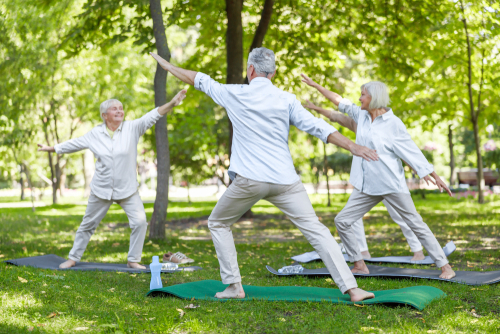
There are over 100 different types of arthritis. Therefore, when we talk about arthritis, we are referring to rheumatic diseases and/or conditions that affect joints. Common symptoms include pain, aching, stiffness, and swelling in or around at least one joint. Osteoarthritis is the most common form. Others are rheumatoid arthritis, psoriatic arthritis, and gout.
The aim of treatment is pain control, improving or maintaining function, and minimizing damage to joints. Common treatments include medication, lifestyle changes, and exercise. The actual treatment will depend on the type of arthritis and other patient-specific factors. Unfortunately, pain and stiffness in the joints often discourage people from exercising.
The benefits of exercise
Experts agree that exercises should be aimed at improving flexibility, strengthening muscles and improving physical condition. Without exercise, the joints become more stiff and more painful. Exercise keeps bones, muscles, and joints healthy. Without exercise, the muscles weaken, and the bones can become osteoporotic.
Medical authorities agree that exercise for people with osteoarthritis should incorporate components that can improve muscular strength, flexibility, and fitness. Increased muscular strength is essential for normal function. It supports and protects arthritic joints, which will reduce pain. Flexibility exercises also help to reduce pain and stiffness, thus improving mobility and enabling people to move more easily. Flexibility also facilitates the circulation of body fluid and blood, which enhances healing. Joint stiffness and impaired physical function are characteristic of many arthritic conditions, for example fibromyalgia, scleroderma and spondylitis
Tai Chi will not cure arthritis! Will it help all types of arthritis? Actually, it can help some types more than others. Mind-body exercises have positive effects on pain, sleep quality, stress and anxiety, and mood disorders, similar to aerobic exercise. The deep breathing, flowing movements, and mindfulness of Tai Chi will help reduce pain and increase flexibility. It also improves strength, while it reduces stiffness and pain. Tai Chi pumps blood and body fluids through the muscles, tendons and joints, facilitating the transformation and strengthening of these parts of the body.
Tai Chi is scientifically recognized as a method for improving balance and physical function. Best of all, Tai Chi movements can be adapted and/or modified by certified instructors as a therapeutic approach to meeting the individual needs and limitations of individuals with arthritis.
Many people with arthritis suffer from back pain. Tai Chi’s slow, focused movements and deep breathing, improve pain and/or discomfort. The muscles in the lower back are supported by strong abdominal and pelvic muscles from regular practice of Tai Chi exercises. Body alignment, posture, and balance are also improved.
Research
Evidence suggests that Tai Chi helps hip, ankle and knee mobility for those with Rheumatoid Arthritis. It has also been found to be helpful for people with hip and knee osteoarthritis. Recently, researchers at Tufts Medical Center in Boston, Massachusetts, discovered that Tai Chi specifically reduces the pain and physical impairment of people with severe knee osteoarthritis.
In April 2007, the largest study of Tai Chi for arthritis was published in the Arthritis Care and Research Journal. It showed that Tai Chi is not only safe, but effective for those with joint discomfort.
The American College of Rheumatology recommends “movement-based, mind-body exercises”, and “strongly” recommends Tai Chi especially for those with knee or hip osteoarthritis. While Tai Chi is safe for individuals with rheumatoid arthritis, authors of a 2023 research review felt that additional research was needed to determine whether it would improve their pain or physical function.
A Systematic Review and meta-analysis (Archives of Physical Medicine and Rehabilitation, October 2021), researchers stated that “Tai Chi is an excellent program to improve body anti-inflammatory capacity”. They felt that regardless of their medical condition, individuals would benefit from practicing Tai Chi (with proper exercise parameters).
There have been over 500 studies and 120 systematic reviews performed. The Can Fam Physician. 2016 November article stated that though benefits are numerous, when it comes to Tai Chi, a couple of the strongest evidence of benefits is for fall prevention, osteoarthritis, Parkinson disease, and improvement in balance.
Why Does Tai Chi Work?
Regular practice of Tai Chi meets all these requirements, and provides many other advantages too. Many experts recommend Tai Chi for osteoarthritis of the hip, hand, and knee. Studies show that the practice can improve mobility in the ankles, hips and knees in people with rheumatoid arthritis.
Tai Chi principles help practitioners mentally and physically align. For example: students work on correct body alignment and posture, they learn how to relax their bodies and minds, how to seek stillness in movement, how to connect their upper and lower body, use their mind to govern their body, and how to move continuously without interruption or stopping. During practice, we focus on movements and coordinating our body.
Experts (both Tai Chi and otherwise) know that a positive, relaxed mind can help to heal and maintain a healthy body. Tai Chi integrates mind and body. We use the conscious mind to direct each movement and the inner force (energy). It is becoming clear that the” immense power of the mind has not yet been fully appreciated”. According to the Osteoarthritis Foundation International, Tai Chi is one of the most powerful mind-body exercises. Engaged students begin to realize that with the internal energy at his or her disposal, he or she can possess greater physical and mental strength. Not only is self-control and mental clarity improved, we also enjoy better mood stability.
Tai Chi provides many benefits for those with arthritis, such as: improved flexibility, coordination, muscle strength, and joint stability. It also provides pain and stiffness relief and can help prevent or delay arthritis in healthy people.
Tai chi gently frees up stiff joints and muscles associated with arthritis. It can help with stamina and general fitness by improving the function of the heart and lungs. Because it focuses on weight transference, it can also improve balance and prevent falls. Additionally, Tai chi is a mind body exercise. This means that it encourages serenity and relaxation of the mind, which reduces pain and stress. As a result, those who practice tai chi often experience less depression and enhanced immunity.
You will get the most benefit, if you practice at least twice a week for 20 minutes to one hour. To continue reaping the benefits practice should be regular and ongoing. Even 5-10 minutes a day is better than nothing!
At Movement In Mind, we offer the Tai Chi for Arthritis programme developed by the Tai Chi for Health Institute. Shirley is one of Dr Paul Lam’s Instructors. Trained to deliver sessions safely and effectively, Dr Lam’s instructors use methods approved by medical experts in the field.
Almost anyone, of any physical condition, can begin and continue to progress regardless of age. Tai Chi for Arthritis can be practised sitting as well as standing
